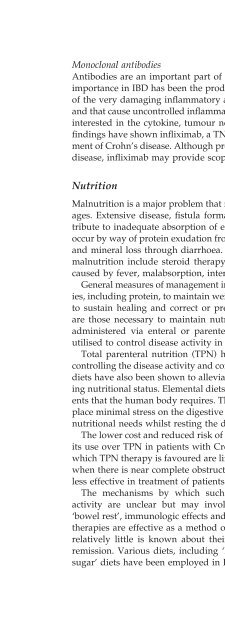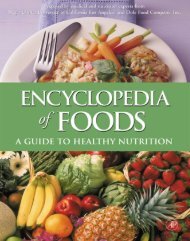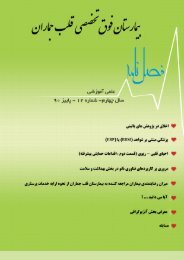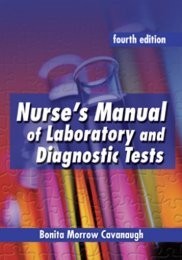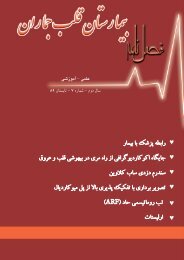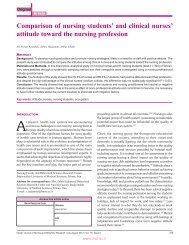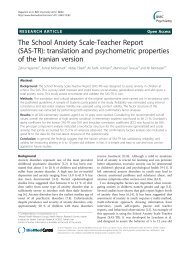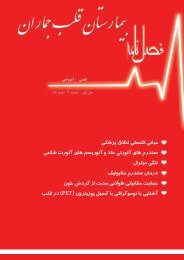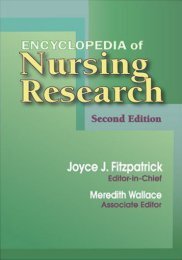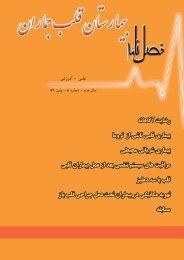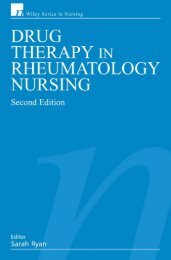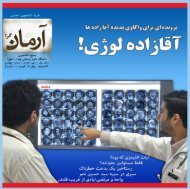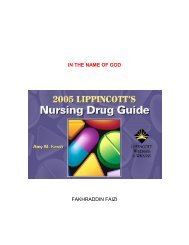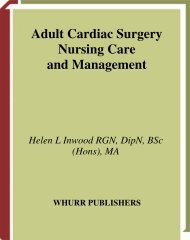Gastrointestinal Nursing.pdf
Gastrointestinal Nursing.pdf
Gastrointestinal Nursing.pdf
You also want an ePaper? Increase the reach of your titles
YUMPU automatically turns print PDFs into web optimized ePapers that Google loves.
The Large Intestine 95Monoclonal antibodiesAntibodies are an important part of the body’s defence mechanism. Of greatimportance in IBD has been the production of monoclonal antibodies to someof the very damaging inflammatory agents (cytokines) that are overproducedand that cause uncontrolled inflammation. In particular, scientists have becomeinterested in the cytokine, tumour necrosis factor alpha (TNFα). Preliminaryfindings have shown infliximab, a TNFα inhibitor, can be effective in the treatmentof Crohn’s disease. Although presently restricted to use in severe Crohn’sdisease, infliximab may provide scope for further treatments in the future.NutritionMalnutrition is a major problem that frequently complicates IBD patients of allages. Extensive disease, fistula formation and surgical resection can all contributeto inadequate absorption of essential nutrients. Nutrient losses in IBDoccur by way of protein exudation from the inflamed gut, iron loss by bleedingand mineral loss through diarrhoea. Other factors potentially contributing tomalnutrition include steroid therapy and increased nutritional requirementscaused by fever, malabsorption, internal fistulae or inflammatory activity.General measures of management imply a balanced diet with sufficient calories,including protein, to maintain weight, and adequate vitamins and mineralsto sustain healing and correct or prevent deficiencies. Exceptional measuresare those necessary to maintain nutrition in an acutely ill patient; normallyadministered via enteral or parenteral routes, these treatments are widelyutilised to control disease activity in IBD.Total parenteral nutrition (TPN) has been demonstrated to be effective incontrolling the disease activity and complications of Crohn’s disease. Elementaldiets have also been shown to alleviate disease activity in addition to improvingnutritional status. Elemental diets are liquid diets that contain all the nutrientsthat the human body requires. These nutrients come in a digested form toplace minimal stress on the digestive system. Elemental diets supply completenutritional needs whilst resting the digestive system.The lower cost and reduced risk of complications with elemental diet favourits use over TPN in patients with Crohn’s disease. The only circumstances inwhich TPN therapy is favoured are limited to patients with a very short gut orwhen there is near complete obstruction. Elemental diet has been found to beless effective in treatment of patients with ulcerative colitis.The mechanisms by which such nutritional therapies improve diseaseactivity are unclear but may involve the intestinal adaptive response to‘bowel rest’, immunologic effects and nutritional factors. Although nutritionaltherapies are effective as a method of inducing remission in Crohn’s disease,relatively little is known about their use for the maintenance of long-termremission. Various diets, including ‘low residue’ and ‘high-fibre low-refinedsugar’ diets have been employed in IBD without any proven benefits.


